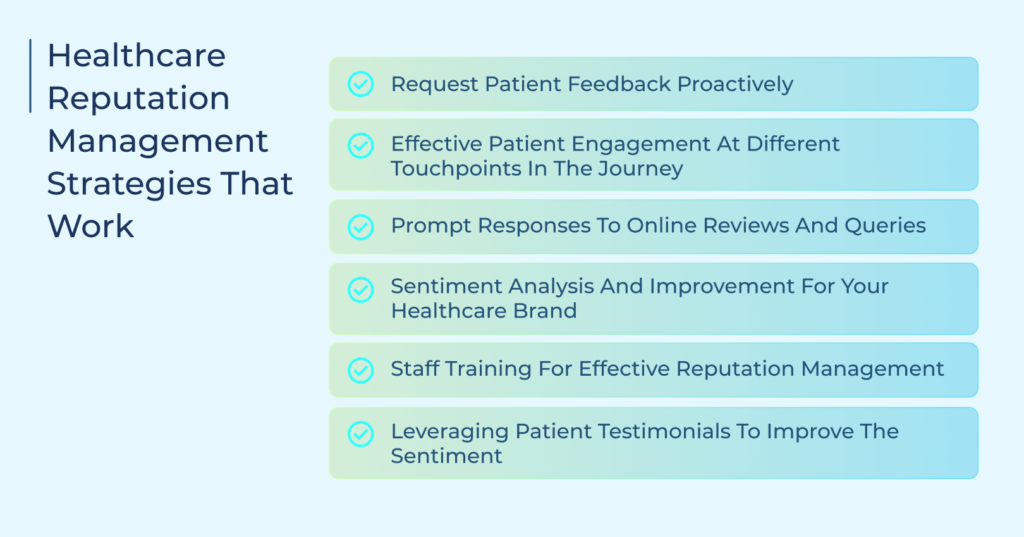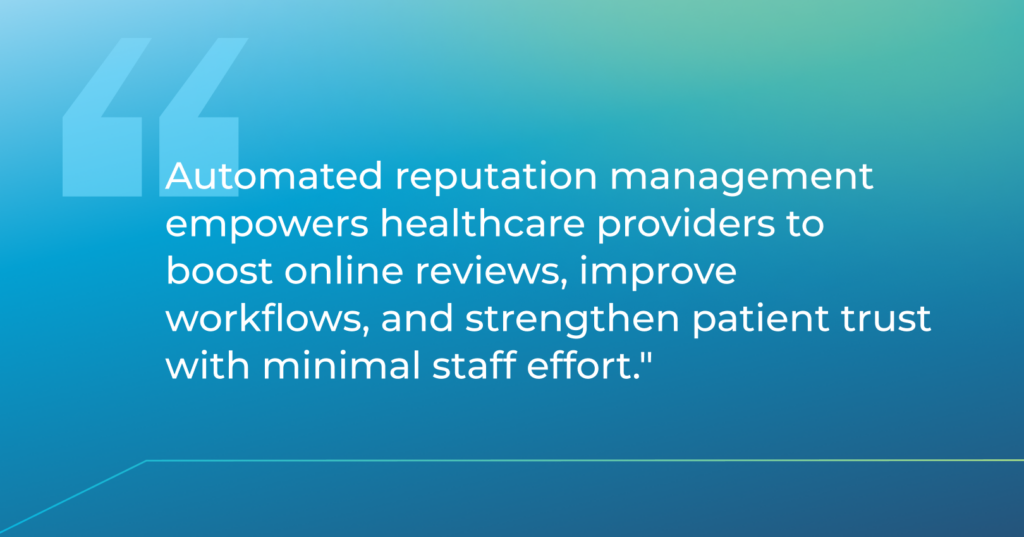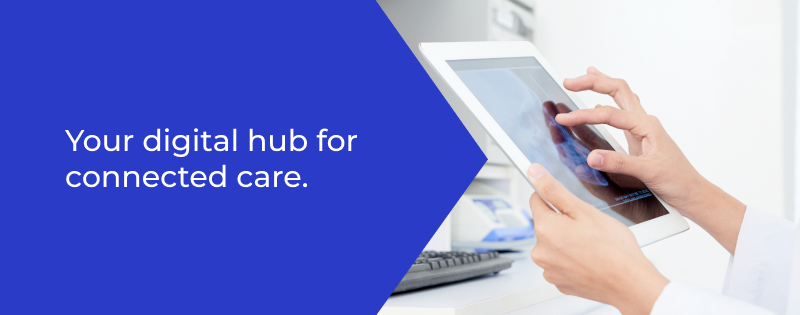A patient engagement platform is a digital hub that makes it easier for patients to…

Healthcare Reputation Management: How Can Automation Help?
Automation technology continues to revolutionize the healthcare industry, improving patient care and operational efficiency. And, as staffing challenges and burnout continue to handcuff departments, more and more organizations are leaning into advanced automation technologies for various tasks. One of those tasks is reputation management.
According to a survey by Software Advice, 71 percent of patients would use online reviews as the first step in finding a new doctor, making it increasingly critical that organizations stay on top of their online reputation.
Reputation management technology can help organizations filter negative reviews, and it can also help them improve their online reputation with minimal effort.
In this blog post, we will dive into how healthcare organizations drive revenue with automated reputation management and the three things to consider when deciding on a reputation management software.
What’s Healthcare Reputation Management?
For healthcare organizations, reputation management refers to monitoring, influencing, and maintaining the perceptions and opinions their targeted audience has about them. This not only involves patients, but also staff and partners. It’s about healthcare providers managing themselves as a brand that the wider community can believe in and trust.
How Automation Can Help Healthcare Providers With Reputation Management
Automation tools offer practical ways to gather, analyze, and respond to patient feedback without adding work for staff. The right systems let providers focus on care while addressing the factors shaping their public image. Below are four core reasons why healthcare organizations drive revenue with automated reputation management:
Improves Online Reputation
Healthcare organizations can improve their online reputation with minimal effort by leveraging survey automation. They have an online reputation regardless of how busy they are, so an embedded reputation management tool will help them filter positive/negative reviews accordingly.
More Actionable Reviews
Automated reputation management makes reviews more actionable. If a patient gives a negative review, it helps the practice remedy the issues that prompted them to give a negative review. If the patient’s doctor’s office, health system, etc., has a reputation management tool, they invest in the patient’s perception and satisfaction with their services. This empowers healthcare organizations to provide a stronger patient experience.
Improves Workflow Processes
Automated reputation management can also help overworked staff members improve their workflow processes. For example, if patients say the practice is unclean or behind schedule, the staff becomes fully aware of their issues and can work together to resolve them. They are creating more efficient workflows and making constant improvements in the office.
Automating Feedback Collection Through Surveys
Your patients’ opinions matter. While some organizations still use manual processes for soliciting patient feedback, it’s pretty time-consuming and often fails to garner the best results.
By automating this same process, providers can ask for feedback at every touchpoint on a timely basis. It’s common knowledge that surveys sent within an hour of visits get responses more often than those sent days later. Hence, regular feedback collection through automation means more data that can be used to identify service gaps. It also frees up the staff to focus on patient care.
Benefits of Automating Reputation Management in Healthcare
We’ve already established that automation helps healthcare organizations manage their public image through systematic data collection and response. Now, let’s uncover the deeper benefits that lie beneath the surface.
Improved Patient Relationships Based on Trust
Automated systems can spot patterns and potential issues in patient feedback that might otherwise go unnoticed. This is important because addressing even the most subtle concerns makes patients feel valued, and that allows them to place their trust in the healthcare organization.
Consider an automated closed-loop feedback that sends updates to patients about resolved issues to demonstrate accountability. When patients know they are being heard, they report higher satisfaction scores.
Operational Efficiency
Deploying an automated healthcare reputation management system means your front desk staff can now focus on in-person patients instead of making follow-up calls, managing surveys, or tracking down paperwork.
These systems automatically sort feedback by department, topic, or urgency without any human intervention. Additionally, the reported data becomes more accurate, free of manual entry errors. The entire process makes it highly efficient to simply again current information for decision-making from a single dashboard.
Positive Online Sentiment
Automation helps providers increase their volume of patient reviews. Systems that send review requests at optimal times (like 30 minutes after appointments) generate 3-5 times more responses than random outreach.
At the same time, automation makes it easier to catch negative feedback early. This allows providers to respond promptly and address concerns, often turning a negative review into a positive one within 24 hours.
Does Automation Offer Good ROI?
Automation in reputation management delivers measurable financial returns for healthcare organizations. The upfront investment pays off through decreased staff workload, increased patient volume, and better care outcomes.
Healthcare providers save up to $31,200 annually by replacing manual monitoring with automated systems, while hospitals with high Reputation Scores earn an extra $1.3 million per bed yearly. The initial investment ($300-2,000 monthly) pays off quickly as staff redirect time to patient care instead of review management.
The numbers speak for themselves: reduced staff costs, higher patient volume, and improved online visibility deliver returns that far exceed implementation expenses.
Healthcare Reputation Management Strategies That Work
Effective reputation management combines technology with a human touch. These approaches create sustainable improvements in how patients perceive healthcare organizations.

Request Patient Feedback Proactively
It’s always best practice to schedule feedback requests immediately after appointments. A text message survey with 1-3 questions is better than a lengthy email questionnaire. For treatments, especially complicated ones, consider asking for feedback after weeks. This timing captures different aspects of the patient experience and ensures accurate data.
Effective Patient Engagement at Different Touchpoints in the Journey
Healthcare executives should remember that a patient’s experience begins well before the actual appointment. Pre-appointment communication plays a key role in setting expectations and reducing anxiety. Automated reminders that include helpful details, such as parking instructions and check-in procedures, are often linked to higher patient satisfaction.
Keeping patients informed about wait times or delays is equally important. For example, sending a notification that their appointment may be delayed by 30 minutes due to a backlog helps manage expectations. When patients feel informed and respected, they’re less likely to leave negative feedback about wait times.
Prompt Responses to Online Reviews and Queries
Many healthcare organizations make the mistake of ignoring their online reviews. Letting negative reviews pile up on Google Maps drives potential patients away, especially when they are searching for nearby providers.
Hence, within the lines of effective healthcare reputation management, organizations must create response templates for common situations while keeping each reply personal. Be polite and professional by including a thank you, acknowledging the issue, and taking action in each response.
Someone who left a negative review should be contacted as soon as possible for more details. They will highly appreciate the promptness, and with the correct actions, providers can turn that frown upside down.
Sentiment Analysis and Improvement for Your Healthcare Brand
Natural language processing tools identify patterns in comments that indicate underlying problems. Track sentiment changes over time. Weekly reports showing trends help administrators spot emerging issues before they become widespread complaints.
Compare sentiment across departments or locations. This comparison helps identify best practices that can be transferred throughout the organization.
Staff Training for Effective Reputation Management
Train all staff on the importance of patient perception. They are still vital to your reputation, even with automated workflows, because the front desk staff significantly influences overall satisfaction scores.
Healthcare organizations can host workshops and role-play difficult scenarios to give staff the confidence to perform in real situations. Additionally, don’t forget to share feedback results with teams. Positive changes boost morale and enable staff to work harder.
Leveraging Patient Testimonials to Improve the Sentiment
Collect video or written testimonials from satisfied patients with proper consent. Brief stories about positive experiences influence potential patients more effectively than statistics or claims. Feature these testimonials where potential patients make decisions, such as on the appointment scheduling page.
Things to Consider When Choosing a Reputation Management System
There are certain factors providers must focus on while searching for a healthcare reputation management system. It’s not good practice to simply go for a solution based on cost or reviews alone. The system must be robust, HIPAA-compliant, and tailored to the specific needs of healthcare environments.
Ease of Use
Your reputation management system should make life easier, not more complicated. Even an automated system only proves useful if the system itself is intuitive. Hence, make sure that your chosen platform requires minimal training. It should be easy for staff to use and adopt. For instance, clean, user-friendly interfaces will go a long way in increasing your productivity and long-term value.
Control
When evaluating a reputation management system, consider how much control it offers over where and how reviews are shared. A good system should allow healthcare organizations to manage the visibility of patient feedback across platforms.
For example, some platforms enable organizations to redirect positive reviews to sites like Google or Facebook, while choosing not to post them on others like Yelp.
This level of control equips providers to amplify their positive feedback in online communities or where their targeted audience lies.
Seamless Integration
When looking to automate reputation management, finding a product that seamlessly integrates with your current technology, office workflow, and budget is essential. Most companies integrate directly with the practice’s EHR. With more advanced software, you can skip the EHR process and the fees that come with it.

Automate Healthcare Reputation Management With TeleVox
Your reputation isn’t built in boardrooms. It’s built online, review by review. TeleVox lets you take control of that narrative. Automatically send post-visit review requests at the right time, direct happy patients to platforms that matter (like Google and Facebook), and catch negative feedback before it snowballs.
No more chasing reviews manually or letting silent dissatisfaction damage your brand. With TeleVox, reputation management becomes seamless, scalable, and strategic, all without adding pressure to your already-stretched staff.
But here’s where it gets smarter: TeleVox’s Smart Agent. Our AI-powered assistant works around the clock to handle patient communications across voice, text, and chat, answering questions, confirming appointments, and collecting feedback while integrating with your EHR.
Want to see it in action? Schedule a demo and discover how TeleVox turns everyday conversations into five-star reviews.



